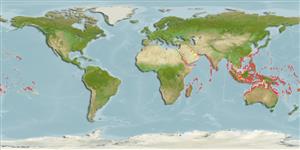Common names from other countries
Environment: milieu / climate zone / depth range / distribution range
นิเวศวิทยา
เกี่ยวกับทะเล,น้ำเค็ม เกี่ยวกับหินโสโครก; ไม่มีการอพยพย้ายถิ่น; ระดับความลึก 0 - 30 m (Ref. 37816). Tropical; 30°N - 30°S, 30°E - 139°W
Indo-Pacific: Red Sea and East Africa to French Polynesia, north to the Ryukyu and Ogasawara islands, south to Queensland, Australia.
Length at first maturity / ขนาด / น้ำหนัก / Age
Maturity: Lm ?, range 24 - ? cm
Max length : 40.0 cm SL เพศผู้/กระเทย; (Ref. 3503); common length : 27.0 cm TL เพศผู้/กระเทย; (Ref. 5450); น้ำหนักสูงสุดที่มีการรายงาน: 2.4 kg (Ref. 11441)
เงี่ยงครีบหลัง (รวม) : 12 - 14; ก้านครีบอ่อนที่หาง (รวม) : 5 - 7; เงี่ยงครีบก้น: 3; ก้านครีบอ่อนที่ก้น: 5 - 6. Colors matching surroundings and extremely well-camouflaged (Ref. 48635). Pelvic and anal fins spines are similarly developed. 12-14 stout grooved spines, each with a large venom sack at its base (Ref. 37816).
Most widespread stonefish (Ref. 4313). Found on sandy or rubble areas of reef flats and shallow lagoons and in small pools during low tide well camouflaged among the substrate and sometimes even covered with algae (Ref. 5213, 5503). Solitary species (Ref. 37816). Feeds on fishes and crustaceans. The dorsal fin has 2 grooves serving as seringes of venom; their stings are excruciatingly painful and can occasionally be fatal. A serum exists which is effective if applied immediately after the infliction. World's most venomous fish (Ref. 37816). Uncommon in markets. In Hong Kong live fish markets (Ref. 27253). Also Ref. 57406.
Life cycle and mating behavior
Maturities | การสืบพันธุ์ | Spawnings | Egg(s) | Fecundities | ตัวอ่อน
Poss, S.G. and K.V. Rama Rao, 1984. Scorpaenidae. In W. Fischer and G. Bianchi (eds.) FAO species identification sheets for fishery purposes. Western Indian Ocean (Fishing Area 51). Vol. 4. FAO, Rome. pag. var. (Ref. 3503)
IUCN Red List Status (Ref. 130435)
CITES (Ref. 128078)
Not Evaluated
Human uses
การประมง: มีการค้าเพียงเล็กน้อย; สถานที่แสดงสัตว์และพืชน้ำ: การค้า
เครื่องมือ
Special reports
Download XML
แหล่งที่มาจากอินเตอร์เน็ต
Estimates based on models
Preferred temperature (Ref.
115969): 24.9 - 29.3, mean 28.3 (based on 3300 cells).
Phylogenetic diversity index (Ref.
82804): PD
50 = 0.5312 [Uniqueness, from 0.5 = low to 2.0 = high].
Bayesian length-weight: a=0.01622 (0.00609 - 0.04318), b=3.05 (2.82 - 3.28), in cm Total Length, based on LWR estimates for this (Sub)family-body shape (Ref.
93245).
ระดับชั้นอาหาร (Ref.
69278): 4.4 ±0.77 se; based on food items.
ความสามารถในการกลับคืนสู่ปกติ (Ref.
120179): ต่ำ, เวลาต่ำสุดที่จะทำให้ประชากรเพิ่มขึ้นเป็น 2 เท่าใช้เวลา 4.5 - 14 ปี (Preliminary K or Fecundity.).
Fishing Vulnerability (Ref.
59153): Moderate vulnerability (39 of 100).
